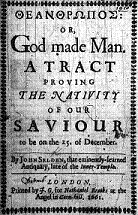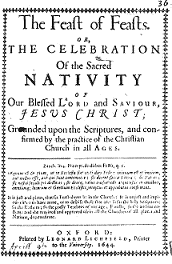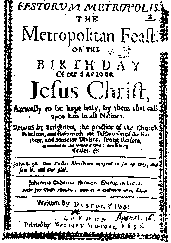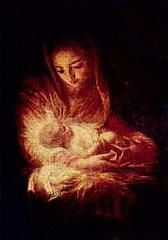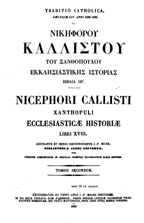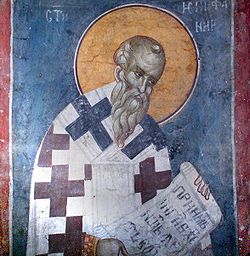Is Christmas Lawful,
or Is It Pagan?
It’s that time of year again, the time when men of good will are subjected to the complaints of crusty, hard-hearted, Puritanical curmudgeons who would shut out every particle of joy from life; the time of year when we hear stale protests against the most celebrated event in history, the crowning point of the year, when the whole world rejoices at the Savior’s birth, and the story of the Nativity is told in every language; at that time when we should most rejoice for heaven’s salvation and the triumph of Christian faith, we are scolded instead, and told that celebrating Christmas is somehow “unchristian.” “Wicked Christmas-keepers, Repent!”
Is there anything to these perennial objections? Can we celebrate the Nativity? Can we observe Christmas in our homes and churches? Or is the holiday season “lawful” only if it is secularized and kept free of Christ? Or is even this objectionable? In this article, we look at “anti-Christmasism” and address the question whether it is permitted to commemorate the Savior’s birth December 25th?
Spirit of Legalism:
Overcorrecting Catholic Excesses
The spirit of “anti-Christmasism” is born of the spirit of severity and legalism. It finds its principle source in Calvinism. Calvinism is a system of belief that views God as an arbitrary and severe Sovereign who savingly loves some men and predestinates them to salvation, but actively hardens others and predestinates them to the eternal flames of hell. The God of Calvin is a God of limited love and limited atonement, who has Jesus die, not for the world, but only the select few, a God who whimsically bestows his grace on some, and just as whimsically withholds it from others, a God whose unpredictable bestowal of grace and grudging gift of saving love seems calculated to expunge all joy from human life and to cause men to treat one another with equal stinginess and severity. John Calvin once said that “babies are born sinners and are unaccepted and hated by God” (Institutes, Bk. IV, Chpt. 16, Sec. 17). Can a system of belief that makes God the hater of babies, that makes God an austere tyrant who loves some and not others, be expected to produce a charitable view of our fellow man? Can it foster generosity, love, and joy in the human heart? Will it not rather spawn a cold and crabbed heart like that of very Scrooge himself? History testifies that, given the chance to come to seed and show its real self, Calvinism - or at least the Calvinism of yesteryear - produces the latter. In Calvin’s Geneva one could be fined and punished for observing Christmas, so also in Scotland, where John Knox, the Presbyterian reformer, held sway. For Knox, Christmas was a piece of popish superstition, an "abomination” to be shunned like the pollution of idols and punished by the civil magistrate.
“By contrary Doctrine, we understand...the superstitious observation of...the Feasts (as they term them) of Apostles, Martyrs, Virgins, of Christmas, Circumcision, Epiphany, Purification, and other fond feasts of our Lady. Which things, because in God's scriptures they neither have commandment nor assurance, we judge them utterly to be abolished from this Realm; affirming further, that the obstinate maintainers and teachers of such abominations ought not to escape the punishment of the Civil Magistrate.” [1]
Knox’s views became standard fare among Calvinists. When Cromwell and the Puritans gained power in England during the 1600’s they proceeded to outlaw celebration of Christ’s nativity, requiring that churches be shut and shops and businesses be open. Similar attitudes and attempts to banish Christmas were carried to North America by the Pilgrims of the Plymouth Plantation.
Knox and Scottish Presbyterians viewed the public worship of the church as a type of liturgical ceremony whose ritual is minutely regulated by God, just as it had been in the temple service. To be acceptable, worship must be “authorized.” The least innovation is like the “strange fire” offered by Nadab and Abihu and “invalidates” worship, causing fire to leap out of the altar and consume the worshiper. The regulatory rule of worship (as it came to be known) is best described by Samuel Miller (1769-1850) in his book “The Worship of the Presbyterian Church”:
“The Scriptures being the only infallible rule of faith and practice, no rite or ceremony ought to have a place in the public worship of God, which is not warranted in Scripture, either by direct precept or example, or by good and sufficient inference.”[2]
Presbyterian influences in the nondenominational churches of Christ (Stone-Campbell Movement) introduced the regulatory rule of worship into that body, together with the spirit of “anti-Christmasism,” where remnants of both exist until this day. It should be pointed out, however, that other Reformers, such as Luther and Beza, took no exception to celebrating the Nativity. It is only in churches coming under the influence of Knox and Calvin that Christmas was shunned.
Freedom to Esteem the Day
The regulatory rule of worship is of purely human origination. There is no requirement in the Bible that the worship of the church be conformed to a particular pattern. In fact, in the churches of Christ “example, command, and necessary inference” were first used positively by Thomas and Alexander Campbell to identify what the church must do (meet the first day of the week to observe the Lord’s Supper, etc), not negatively to delimit what alone may be done. It was not until second or third generation preachers (e.g., Moses Lard) that the formula was used negatively to banish such things as choirs, baptisteries in the building, etc. Negative use of “example, command, and necessary inference” proved horribly destructive, divisive, and legalistic. It unleashed the most astonishing series of divisions within the churches of Christ, as men feared to eat in the church building, have water fountains, hat racks, Sunday school, multiple cups in worship, and even support Christian colleges and orphans’ homes from church funds lest they forfeit salvation by attending a congregation guilty of an unauthorized “act of worship” or “work” of the church. Instead, we believe that limiting “example, command, and necessary inference” to positively identify what should be done, rather than what may be done, was correct, and that the lawfulness of all other practices must be tested by “principle, precedent, and precept” – if a particular practice does not violate a principle, precedent, or precept of scripture, what objection can there be? However, questions of hermeneutic aside, the scriptures are plain that Christians have freedom of conscience to observe special days:
“One man esteemeth one day above another: another esteemeth every day alike. Let every man be fully persuaded in his own mind. He that regardeth the day, regardeth it unto the Lord; and he that regardeth not the day, to the Lord he doth not regard it.” Rom. 14:5, 6
We thus find Paul and the apostles using Christian liberty to keep Jewish feasts like Passover and Pentecost (Acts 18:21; 20:16). Naturally, these were not binding or obligatory and Paul condemned the Galatians for observing Jewish “days, months, times, and years” as if they were required for men to be acceptable with God (Gal. 4:10). However, the point remains: Christians were free to esteem various days and to set them aside in honor of the Lord. Thus, there can be no scriptural objection to Christians setting aside a day to remember the birth of the Savior.
Was Christ Born December 25th?
Some object that December 25th was not “really” the day Christ was born; they urge that it would have been too cold for shepherds to encamp in the fields near Bethlehem, keeping watch over their flocks, and that to honor Christ’s birth in December is therefore to perpetuate a lie. However, there is no substance to this charge. I presently reside in Carlsbad, New Mexico. A look at a world map shows that Carlsbad is almost exactly the same latitude as Jerusalem. We have very mild winters here. One can be outside without a coat most days of the year; temperatures at night in December are relatively mild; most years, there is nothing to prevent one from camping in a tent at night. Remember, also, that Abraham and the patriarch lived in tents their whole lives in Canaan, never once dwelling in houses with walls. Therefore, the idea that shepherds could not have been encamped in the field in Bethlehem simply has no merit; it may fool uncritical minds who suppose December in Bethlehem is bitter cold like New England, but those who stop and consider the matter will see it is purely fallacious.
Was Christ born December 25th? We believe that the evidence of scripture and sacred history show that he was. Daniel said that the Messiah would be “cut off” (crucified) and annul the legal efficacy of the animal sacrifices after a 3 ½ year ministry (Dan. 9:26, 27). Jesus died Nisan 15, AD 33. If we trace back 3 ½ years from Nisan 15, AD 33, we arrive at Heshvan 15th (Nov. 8), AD 29 when Christ was baptized. Luke said Jesus was on the threshold of his 30th birthday at his baptism, and that he then took a 40 day fast in the wilderness, followed by a period of temptation, in preparation for his ministry, after which he began actively teaching (Lk. 2:1, 23; 4:2, 14). Jewish men began their public ministries when they attained 30 years. Jesus’ wilderness fast and temptation thus seem likely to have been timed to end at or about his 30th birthday. Allowing seven days in which his temptation was accomplished over and above his 40-day fast, we arrive at Dec. 25th (Nov. 8th + 40 + 7 = Dec. 25th). Following his fast and temptation, Jesus returned to John at Betharba, where he made his first disciples (Phillip, Andrew, Peter, Nathaniel), showing that he had now attained the age of teacher and was 30 years old (Jn. 1:29-51). The wedding at Cana which followed a few days later (Jan. 6), marks Epiphany, when Jesus manifested his glory to his disciples (Jn. 2:1-11). Thus, simple chronological reconstruction shows that Jesus birthday would have occured in the short time between his baptism and making his first disciples and the feast of Epiphany. Other evidence of Christ’s winter birth includes reconstruction of the priestly courses from AD 70 to the conception of John the Baptist in the fall (September) of 3 BC and Jesus’ birth fifteen months later in December, and the death of Herod the Great shortly before Passover, 1 BC, several months following Jesus’ birth.[3] This three-fold witness provides competent evidence of Jesus' winter birth. And since Dec. 25th emerges all by itself simply by adding the length of the Lord's fast to the date of his baptism, what is to prevent us from accepting the testimony of tradition, especially in view of the fact that it enjoys the almost unanimous voice of the church fathers?
Pagan Origination?
Some object that Christmas is of pagan origin; that it is a “Christianized” version of the winter solstice and that many of its customs are of pagan origination. However, the scripture plainly teaches that things wholesome or indifferent in themselves do not need to be traced back to their origin to make sure they are pure or free of pagan contamination.
In I Corinthians, Paul addressed the question of meats offered unto idols. Could the Christian partake? Paul answered that an idol is nothing and has no existence in the world. Food offered to an idol cannot change the food or pollute it. Paul instructed the Corinthians to eat whatever was sold in the market stalls, without asking if it was offered to an idol.
“As concerning therefore the eating of those things that are offered in sacrifice unto idols, we know that an idol Is nothing in the world, and that there is none other God but one...Whatsoever is sold in the shambles, that eat, asking no question for conscience sake; for the earth is the Lord’s and the fulness thereof”( I Cor. 8:4; 10:25, 26).
Here we see that food offered to an idol is unaffected and may be freely eaten. Only where the Christian was told it was offered to an idol was he required to abstain, and this lest he seem to consent to worship of idols or cause a weak brother to stumble, not because partaking was wrong in itself (I Cor. 8:10; 10:28-30; Rev. 2:20). But whatever association mistletoe, decorating evergreen trees, holly, the Yule log, and the like traditions may once have had with pagan rites or rituals (if indeed they ever did) are now buried in the sands of time and nobody worships the ancient deities or even knows their names, or associates these festive, holiday trimmings with any idol or pagan god. If it was permissible to eat food offered to idols while most men actively worshipped them and their temples littered the landscape, how much more may we today, when idolatry is dead, decorate our homes with branches of holly, mistletoe, and fragrant evergreens given to men by God for our use and enjoyment? And need we add, that if meat is unaffected by being offered to an idol, a day cannot be polluted either? God is the author and maker of days; all days belong to him (Gen. 1:14-19); Christians should freely enjoy and make wholesome use of everyday God has given them under the sun. And what better use can be made of the day than to honor the Savior and teach our children to rejoice at his birth?
Is Christmas Catholic?
It goes without saying, that if the alleged pagan origin of some traditions offers no objection to celebrating the Nativity of Christ, the asserted Catholic origin of the day can offer no objection either. We agree that there are many things men wrongly introduced into the church, such as the “priesthood,” the “veneration of Mary,” enjoining abstinence from meats and celibacy. But the idea that a day of sacred remembrance, be it attended by feast or fast, must be divinely instituted to be “authorized” is absurd on its face. The Feast of Dedication, commemorating the cleansing of the temple from Antiochus Epiphanes, was instituted by human authority, as were the days of Purim to commemorate the Jews’ escape from Haman (Esther 9:27, 28). Yet, John records that Jesus himself observed the Feast of Dedication (Jn. 10:22). Thus, the mere fact that men have chosen to commemorate the Savior’s birth Dec. 25th is no more objectionable than commemoration of the temple’s rededication, which also was celebrated Dec. 25th (I Macc. 4:41-55).
But is celebration of the nativity of Catholic origin? The answer is, No. The old charge that Catholic authorities decreed the day as a way of turning men from celebration of the winter solstice is totally without historical support. It is a piece of historical revisionism seized upon by the Puritans for which not one whit of evidence exists. No decree from any counsel or church authority instituting the day has once been produced. The fact that Jesus was born in the winter and that pagans celebrated diverse rites at this season is purely coincidental and offers no more proof of the day’s false origination than does pagan celebration at the time of Christ’s resurrection at the vernal equinox falsify that day.[4] The Nativity and Resurrection have always been celebrated by Christians and always will. What pagans may do or have done is irrelevant and is no evidence that church authorities seized upon these days as a way of “Christianizing” pagan devotions.
It is an established and incontrovertible fact that celebration of the Nativity predates Catholicism by centuries. William Cave (1676), in his history of “Primitive Christianity,” writes:
Epiphany...was of old promiscuously used either for the feast of Christ’s Nativity, or for that we now properly call by that name: afterwards the titles became distinct; that of Christ’s Birth (or as we call it Christmas -day) was called the Nativity, and Theophania, the appearances of God in the flesh, two names importing the same thing as Nazianzen notes. For the antiquity of it, the first footsteps I find of it are in the Second Century, though I doubt not that it might be celebrated before, mentioned by Theophilus Bishop of Caesarea, about the time of the Emperor Commodus...
However, that it was kept before the times of Constantine, we have this sad instance. That when the persecution raged under Diocletian, who then kept his Court at Nicomedia, amongst other acts of barbarous cruelty done there, finding multitudes of Christians young and old met together in the Temple, upon the day of Christ’s Nativity, to celebrate that Festival, he commanded the Church doors to be shut up, and fire to be put to it, which in a short time reduced them and the Church to ashes.
I shall not dispute, whether it was always observed upon the same day that we keep it now the twenty fifth of December; it seems probable that for a long time in the East it was kept in January, under the name, and at the general time of the Epiphania, till receiving more light in the case from the Churches of the West, they changed it to this day; sure I am S. Chrysostom in an homily on purpose about this very thing affirms, that it was not above ten years since in that Church (i. e., Antioch) it began first to be observed upon that day, and there offers several reasons to prove that to be the true day of Christ’s Nativity.[5] (Pg. 194, 195)
Here we see that the Nativity predates Catholicism by hundreds of years. That the Catholic church celebrates Christmas makes it no more Catholic than Communion or baptism, which it also practices and celebrates. No Christian need worry that Christmas is a disguised form of paganism surreptitiously introduced into the church by Catholic authorities, or that in remembering Christ’s birth they are guilty of perpetuating paganism.
Conclusion
Celebration of Christ’s Nativity is perfectly lawful and acceptable. No scriptural objection can be advanced against commemoration in church or home of this most wholesome time when the Savior was born and God’s work of redemption drew nigh.
[1] Knox's History, Vol. 2, p. 281. Cf. John Knox, Works (David Laing, ed.; Edinburgh: James Thin, 1895), Vol. ii, p. 190.
[3] For a full discussion and other evidence of Christ’s Dec. 25th birth, see the articles at www.dec25th.info.
[4] Christians celebrated the resurrection long before the Catholic Church existed. Jesus appears to have ordained the custom himself when he said “With desire I have desired to eat this Passover with you before I suffer. For I say unto you, I will not any more eat thereof, until it be fulfilled in the kingdom of God” (Lk. 22:15, 16). Since Christians do not celebrate Passover, it seems likely that Jesus was alluding to the Feast of the Resurrection, which has been celebrated by Christians at the time of Passover for as long as recorded history of the church exists.
[5] WILLIAM CAVE, D.D. (LONDON - A.D. 1676), Primitive Christianity, OR THE RELIGION OF THE Ancient Christians In the first ages OF THE GOSPEL, 194, 195
___________________________________
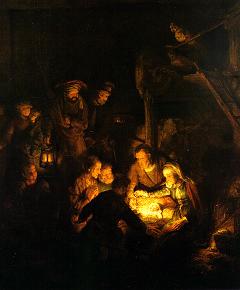
Adoration of the Shepherds
All rights reserved.
 John Seleden’s
John Seleden’s